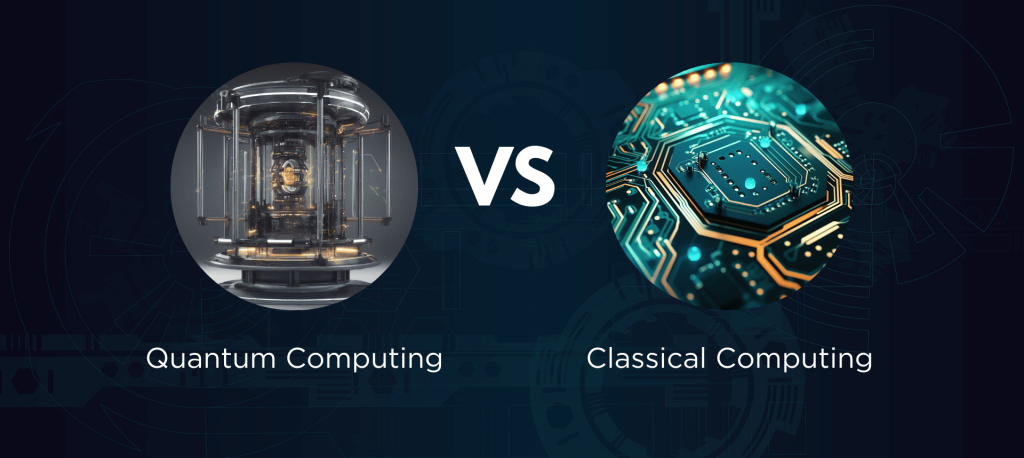
Quantum computing is a rapidly emerging field that has the potential to change the landscape of many industries. That is offering solutions to problems that classical computing cannot solve. Although Q.C is still in its infancy. Its unique capabilities suggest that it will have a profound impact on fields like healthcare, finance, and logistics. But to truly appreciate this potential, it’s important to first understand the key differences between Q.C and traditional/classical computing.
Classical Computing: The Foundation of Today’s Technology
Classical computing is completely different from quantum computing, the technology that powers nearly all of today’s devices — from smartphones to supercomputers. It is based on the use of bits, the basic unit of data in computing, which can exist in one of two states: 0 or 1. These bits are processed using algorithms, performing tasks in a linear fashion, one after another.
Classical computers follow deterministic rules. Where for every input, the output is predictable and consistent. The speed of classical computing is largely dependent on the number of bits and processing power available. And while they can be very fast, they still face limitations. When it comes to solving certain complex or large-scale problems.
Quantum Computing: A New Paradigm
Quantum computing, on the other hand, leverages the principles of quantum mechanics. The science that governs the behavior of matter and energy on the atomic and subatomic levels. The core of Q.C lies in the qubit, the quantum equivalent of the classical bit.
Unlike classical bits, qubits can exist in a superposition of states, meaning they can represent both 0 and 1 simultaneously. This allows quantum computers to process vast amounts of information in parallel. And making them exponentially more powerful than classical systems for certain types of calculations. Another key feature of qubits is entanglement, where two or more qubits become linked. In such a way that the state of one qubit instantly affects the state of another, regardless of the distance between them. This property enables quantum computers to perform complex computations far more efficiently than classical systems.
In essence, Q.C doesn’t just follow traditional binary logic. It takes advantage of quantum phenomena like superposition and entanglement to solve problems. That would otherwise be infeasible for classical computers.
Key Differences Between Classical and Quantum Computing
- Data Representation
- Classical Computing: Data is represented as bits, which are either 0 or 1.
- Quantum Computing: Data is represented as qubits, which can exist in multiple states (0, 1, or both) simultaneously due to superposition.
- Processing Power
- Classical Computing: The power of a classical computer increases linearly with the number of bits. And the speed of the processor, but it is still limited by hardware constraints.
- Quantum Computing: The power of a quantum computer increases exponentially with the number of qubits, allowing it to handle complex problems in a fraction of the time.
- Algorithms
- Classical Computing: Algorithms in classical computing process data in a sequential manner — one step at a time.
- Quantum Computing: Quantum algorithms work in parallel, leveraging superposition and entanglement to perform many calculations simultaneously.
- Parallelism
- Classical Computing: Classical computers achieve parallelism through multi-core processors that divide tasks into smaller parts.
- Quantum Computing: Quantum computers inherently process data in parallel, which allows them to explore many possible solutions at once.
The Impact of Quantum Computing on Industries
While quantum computing is still developing. Its potential to transform industries is already becoming clear. Here are some sectors where Q.C is expected to have a major impact:
1. Healthcare and Pharmaceuticals
- Drug Discovery: Quantum computing could revolutionize the drug development process. By simulating complex molecular structures with incredible precision. This would speed up the discovery of new drugs and treatments. Particularly for diseases that currently lack effective therapies, such as cancer or neurodegenerative conditions like Alzheimer’s.
- Genomic Research: Quantum computing has the potential to significantly improve genetic sequencing. By making it faster and cheaper. This could lead to personalized treatments based on an individual’s genetic makeup, improving the accuracy of medical diagnoses and treatments.
2. Finance
- Portfolio Optimization: Quantum computing can quickly process vast datasets to identify optimal investment strategies. And predict market trends, and assess risks. This could revolutionize financial modeling and risk analysis, making investment decisions faster and more accurate.
- Cryptography: While quantum computers pose a threat to traditional encryption methods. They also offer the potential to create quantum encryption techniques that are virtually unbreakable, leading to new standards in cybersecurity.
3. Supply Chain and Logistics
- Optimization: Quantum computers excel at solving complex optimization problems. In logistics, this could mean finding the most efficient routes. For delivery, minimizing costs, and improving service speed. This capability could dramatically improve everything from inventory management to supply chain logistics.
- Traffic Management: Quantum computing could optimize traffic flow. By considering various factors such as weather, traffic volume, and road closures, providing real-time solutions. To reduce congestion and improve transportation efficiency.
4. Artificial Intelligence and Machine Learning
- AI Training: Quantum computers can process vast datasets far faster than classical computers. Significantly reducing the time needed to train machine learning models. This could accelerate the development of AI systems, enabling more powerful and efficient algorithms.
- Data Analysis: Quantum computing’s ability to perform calculations in parallel. And could enhance pattern recognition, anomaly detection, and predictive analytics, improving AI’s ability to interpret and act on data.
5. Energy
- Energy Optimization: Quantum computing can help optimize energy grids. By leading to more efficient energy distribution and reduced costs. Additionally, it could help in the development of new, more efficient energy storage technologies. Such as better batteries or more efficient solar panels.
- Climate Modeling: Quantum simulations can model complex environmental systems. Allowing for more accurate predictions of climate change and better strategies for mitigating its effects.
6. Materials Science
- New Materials: Quantum computing could accelerate the discovery of new materials. By simulating atomic and molecular structures at a level of detail not possible with classical computers. This could lead to breakthroughs in everything from building materials to electronics and semiconductors.
- Nanotechnology: Quantum computing could enable the development of new nanomaterials with highly specific properties. Which could lead to advances in fields like medicine, electronics, and manufacturing.
Challenges and Roadblocks to Quantum Computing
Despite its potential, quantum computing faces several technical challenges:
- Quantum Decoherence: Qubits are highly sensitive to external disturbances, and maintain their quantum state. (coherence) Long enough to perform calculations is a significant challenge.
- Error Correction: Quantum computations are more prone to errors due to the fragile nature of qubits. Developing effective quantum error correction techniques is critical to making quantum computers reliable.
- Scalability: Building quantum computers with enough qubits to solve real-world problems is a major hurdle. As the number of qubits increases, so does the complexity of maintaining and manipulating them.
Conclusion
Quantum computing represents a fundamental shift in how we approach problem-solving and data processing. Its ability to handle vast amounts of information simultaneously and solve problems that classical computers cannot. And positions it as a game-changer for industries such as healthcare, finance, energy, and materials science.
While Q.Cis still evolving. Its potential to revolutionize industries and transform economies is clear. As the technology matures, businesses must start preparing for the coming wave of quantum disruption. The future of computing isn’t just about faster chips or bigger data centers. It’s about harnessing the unique properties of quantum mechanics to solve problems once thought insurmountable.
Read our latest Blog
